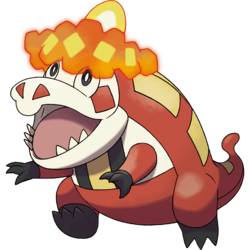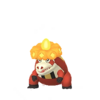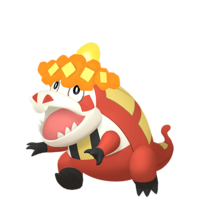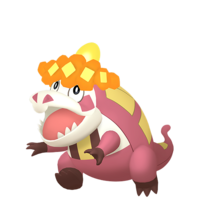From Bulbapedia, the community-driven Pokémon encyclopedia.
Crocalor (Japanese: アチゲータ Achigator) is a Fire-type Pokémon introduced in Generation IX.
It evolves from Fuecoco starting at level 16 and evolves into Skeledirge starting at level 36.
Biology
Crocalor is a bipedal, crocodilian Pokémon. Its stout, melon-shaped body is primarily red, but its face and chest are white simulating a mask; its hands and feet are black with three digits each. It has yellow rectangular scales covering its back and tail, and a pattern of black and yellow stripes on its chest. Its face has a long snout, red square cheeks, a pattern of two red triangles resembling nostrils, and a hook-like upper jaw. When Crocalor opens its mouth, three pairs of sharp teeth can be seen lining its lower jaw.
Atop Crocalor's head is an orange mass of fire energy shaped like a nest, with yellow squares patterning it. This "nest" contains a yellow, glowing, egg-shaped fireball on top, borne out of Crocalor's fire energy and overflowing vitality. Crocalor can control the fireball, sending it out and using it for its moves.[1]
Crocalor's internal flame sac has a valve that connects to its vocal cords. As a result, Crocalor lets out guttural cries as it releases fire from its mouth. Its voice can hardly be described as beautiful; moreover, its voice becomes more destructive as it breathes more powerful fire.[1]
Evolution
Crocalor evolves from Fuecoco and evolves into Skeledirge.
In the anime
Major appearances
Minor appearances
Crocalor appears on an advertisement on billboards in HZ016.
In the manga
In the TCG
- Main article: Crocalor (TCG)
Game data
Pokédex entries
| This Pokémon was unavailable prior to Generation IX.
|
| Generation IX
|
|
Paldea
#5
|
|
Kitakami
#—
|
| Scarlet
|
The combination of Crocalor’s fire energy and overflowing vitality has caused an egg-shaped fireball to appear on the Pokémon’s head.
|
| Violet
|
The valve in Crocalor's flame sac is closely connected to its vocal cords. This Pokémon utters a guttural cry as it spews flames every which way.
|
|
|
Game locations
| This Pokémon was unavailable prior to Generation IX.
|
|
|
Stats
Base stats
| Stat
|
Range
|
| At Lv. 50
|
At Lv. 100
|
81
|
|
141 - 188
|
272 - 366
|
55
|
|
54 - 117
|
103 - 229
|
78
|
|
74 - 143
|
144 - 280
|
90
|
|
85 - 156
|
166 - 306
|
58
|
|
56 - 121
|
108 - 236
|
49
|
|
48 - 111
|
92 - 216
|
Total: 411
|
Other Pokémon with this total
|
- Minimum stats are calculated with 0 EVs, IVs of 0, and (if applicable) a hindering nature.
- Maximum stats are calculated with 252 EVs, IVs of 31, and (if applicable) a helpful nature.
|
Type effectiveness
| Under normal battle conditions in Generation IX, this Pokémon is:
|
|
|
|
|
|
|
|
|
|
|
|
|
Learnset
|
|
|
|
- Bold indicates a move that gets STAB when used by Crocalor
- Italic indicates a move that gets STAB only when used by an Evolution of Crocalor
|
|
|
|
|
- Bold indicates a move that gets STAB when used by Crocalor
- Italic indicates a move that gets STAB only when used by an Evolution or an alternate form of Crocalor
|
|
|
|
|
- Moves marked with an asterisk (*) must be chain bred onto Crocalor
- Bold indicates a move that gets STAB when used by Crocalor
- Italic indicates a move that gets STAB only when used by an Evolution of Crocalor
|
|
|
|
|
- Bold indicates a move that gets STAB when used by Crocalor
- Italic indicates a move that gets STAB only when used by an Evolution of Crocalor
|
Side game data
Evolution data
Sprites
| This Pokémon was unavailable prior to Generation IX.
|
|
|
|
|
Trivia
Origin
Crocalor resembles a crocodile with a calavera pattern. Its Fire typing may be inspired by the fact that crocodiles release excess heat through their mouths. Its affinity for vocal performance could be based on crocodilian behavior during nesting and breeding. Its behavior of spewing flames could also be a reference to the phrase "spitting fire" for a good vocal performance.
Crocalor's overall appearance may draw inspiration from Mexican or Andalusian folk art. The fireballs on its head resemble a sombrero de charro worn by mariachi players, or a sombrero de catite. The scale pattern on its abdomen may be based on a traje cordobés, a traditional vest from Córdoba, Spain that is incorporated into mariachi outfits. Its design may also be inspired by other festivities in Spain and Latin America. It also loosely resembles La Calavera Catrina, a figure associated with the Day of the Dead, given the calavera pattern on its face and the sombrero despite its rotund stature. The "nest" on top of its head could also vaguely resemble a bouquet of Mexican marigold. It also resembles a Mona de Pascua, a traditional Easter cake from Catalonia sometimes served with a hard-boiled egg or egg-shaped confectionery on top.
Crocalor caring for an "egg" atop its head may also be inspired by the observed maternal behavior in crocodiles. Given this together with the typing of its evolution, its design may also draw inspiration from the Ancient Egyptian crocodile god Sobek, particularly the merged deity between Sobek and Horus or Ra, which is often crowned with an oval or disc-shaped ornament for its acquired godhood of the Sun in Hellenistic and Roman Egyptian artefacts.
Name origin
Crocalor may be a combination of crocodile and calor (Spanish and Portuguese for heat). It may also involve vocal or coloratura (an ornamentation of vocal melody).
Achigator may be a combination of あちち achichi ("hot!"), mariachi, and alligator.
In other languages
| Language
|
Title
|
Meaning
|
 Japanese Japanese
|
アチゲータ Achigator
|
From あちち achichi, mariachi, and alligator
|
 French French
|
Crocogril
|
From crocodile and gril
|
 Spanish Spanish
|
Crocalor
|
Same as English name
|
 German German
|
Lokroko
|
From Lohe and Krokodil
|
 Italian Italian
|
Crocalor
|
Same as English name
|
 Korean Korean
|
악뜨거 Aktteugeo
|
From악어 (鰐魚) ageo and 뜨겁다 tteugeopda
|
 Mandarin Chinese Mandarin Chinese
|
炙燙鱷 / 炙烫鳄 Zhìtàng'è
|
From 炙 zhì, 燙 / 烫 tàng, and 鱷魚 / 鳄魚 èyú
|
 Cantonese Chinese Cantonese Chinese
|
炙燙鱷 Jektong'ngohk
|
From 炙 jek, 燙 tong, and 鱷魚 ngohkyùh
|
|
|
|
| More languages
|
 Hindi Hindi
|
फ़्लेमच्छ Flemacch
|
From flame and मगरमच्छ magarmacch
|
 Thai Thai
|
อาจิเกเตอร์ Achiketoe
|
Transcription of Japanese name
|
|
|
|
Related articles
References
External links

|
This Pokémon article is part of Project Pokédex, a Bulbapedia project that aims to write comprehensive articles on each Pokémon species, as well as Pokémon groups and forms.
|

 For other sprites and images, please see Crocalor images on the Bulbagarden Archives.
For other sprites and images, please see Crocalor images on the Bulbagarden Archives.





























